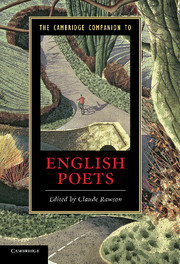Book contents
- Frontmatter
- Introduction
- 1 Geoffrey Chaucer
- 2 Thomas Wyatt
- 3 Edmund Spenser
- 4 William Shakespeare
- 5 John Donne
- 6 Ben Jonson
- 7 George Herbert
- 8 John Milton
- 9 Andrew Marvell
- 10 John Dryden
- 11 Jonathan Swift
- 12 Alexander Pope
- 13 William Blake
- 14 Robert Burns
- 15 William Wordsworth
- 16 Samuel Taylor Coleridge
- 17 George Gordon, Lord Byron
- 18 Percy Bysshe Shelley
- 19 John Keats
- 20 Alfred Lord Tennyson
- 21 Robert Browning
- 22 Emily Brontë
- 23 Christina Rossetti
- 24 Thomas Hardy
- 25 William Butler Yeats
- 26 D. H. Lawrence
- 27 T. S. Eliot
- 28 W. H. Auden
- 29 Philip Larkin
- Further Reading
- Index
11 - Jonathan Swift
Published online by Cambridge University Press: 28 May 2011
- Frontmatter
- Introduction
- 1 Geoffrey Chaucer
- 2 Thomas Wyatt
- 3 Edmund Spenser
- 4 William Shakespeare
- 5 John Donne
- 6 Ben Jonson
- 7 George Herbert
- 8 John Milton
- 9 Andrew Marvell
- 10 John Dryden
- 11 Jonathan Swift
- 12 Alexander Pope
- 13 William Blake
- 14 Robert Burns
- 15 William Wordsworth
- 16 Samuel Taylor Coleridge
- 17 George Gordon, Lord Byron
- 18 Percy Bysshe Shelley
- 19 John Keats
- 20 Alfred Lord Tennyson
- 21 Robert Browning
- 22 Emily Brontë
- 23 Christina Rossetti
- 24 Thomas Hardy
- 25 William Butler Yeats
- 26 D. H. Lawrence
- 27 T. S. Eliot
- 28 W. H. Auden
- 29 Philip Larkin
- Further Reading
- Index
Summary
Byron said of Swift as a poet that ‘he beats us all hollow, his rhymes are wonderful’. Ted Hughes, a century and a half later, wrote: ‘Swift is the only stylist … his writing is the bedrock from which every writer must start.’ Hughes thought him the ‘nearest model’ for the ‘fables’ in his own collection How the Whale Became (1963), and told Kenneth Baker, then Education Secretary, that children should memorize a page of the prose Modest Proposal, along with some pages of Robert Frost and Eliot’s ‘Animula’, as a ‘great sheet anchor’ of sensibility. But it was Swift’s impact on his own work as a poet that Hughes was declaring.
It is sometimes forgotten that Swift was a poet, who wrote almost as much verse as Pope, not counting the latter’s translation of Homer. Swift’s reputation as a poet has been higher among poets than among critics. His admirers and imitators include Byron, Yeats, and Eliot. His standing as a poet has been occluded by the towering reputation of his prose satires A Tale of a Tub (1704) and Gulliver’s Travels (1726), and by the idea, fostered by Pope, that the heroic couplet, as perfected by Pope, was the normative style of serious English poetry, whose master was Pope himself. In the words of Adam Smith:
In our own language, Mr. Pope and Dr. Swift have each of them introduced a manner different from what was practised before, into all works that are written in rhyme, the one in long verses, the other in short. The quaintness of Butler has given place to the plainness of Swift. The rambling freedom of Dryden, and the correct but often tedious and prosaic languor of Addison, are no longer the objects of imitation, but all long verses are now written after the manner of the nervous precision of Mr. Pope.
- Type
- Chapter
- Information
- The Cambridge Companion to English Poets , pp. 213 - 234Publisher: Cambridge University PressPrint publication year: 2011
- 1
- Cited by

